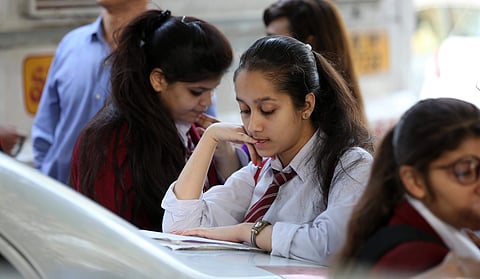

NEW DELHI: The CBSE, while allowing schools to evaluate Class XII students on the basis of Class XI results and internal assessments, apart from Class X results, has also made it clear that in order to remove school level variations, marks have to be internally moderated.
India’s biggest education board has also said that the marks assigned for every subject for the batch on an average have to be consistent with the Class XII board results during the last three years.
In its 30-page affidavit submitted in the Supreme Court on Thursday, the board said that as marks of Class XI and Class XII component will be awarded at school level, they will strictly not be comparable across schools due to the variations in the quality of question papers, standard and the mode of conduct of exams.
Therefore, to ensure standardization, each school has been asked to internally moderate the marks to account for the school level variations by using a reliable reference standard.
While the schools will calculate the total theory marks for each student by adding the marks for Class X, Class XI and Class XII as per the weightage of each class but based on the total marks, moderation has be carried out by the school in Class XI and Class XII.
“Scaling up or down of Class XI and Class XII marks may have to be done in a fair and transparent manner by the result committee,” said the CBSE and as Class X marks are already standardized, no scaling is to be done by the schools.
But the historical performance of the school, in terms of the best overall performance in the previous three years’ Board examination, will be taken as the reference for moderating the marks assessed by the school for 2020-2021.
For example, if in a specific school, the overall average of students in 2017-18 is 72%, in 2018-19 is 74% and in 2019-20, it is 71%, the school will use the subject-wise averages of 2018-19 for moderation, which are the highest for moderation, the board clarified.
The selected year will be the reference year for the school and for each subject, the school will have to follow a broad distribution of marks which will be based on the performance of the specific year by that school in that subject.
The subject wise marks assessed by the school for 2020-2021 should be within a range of + or -5 marks obtained by the students in the school in the subject in the reference year.
However, the overall average marks for the school assessed in 2020-2021, for all the subjects, should not exceed the overall average marks obtained by the school by two marks in the specific reference year, the board under the Union education ministry said.
This clause has drawn mixed reactions with some calling it fair while others saying that it may be disadvantageous for many students.
“I think the CBSE has kept the whip with itself so that some schools do not use the opportunity to score inflated marks for their students in order to raise their own profile and it’s a good thing and all schools must comply with this,” said Pallavi Sharma, principal of Mamta Modern school in Delhi.
But a principal of another school in Delhi-NCR who did not wish to be named said that as every batch is different, putting such a restriction may go against the interest of students.